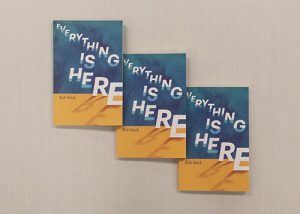 Rob Hack’s first collection of poems, Everything Is Here, explores his relationship to his Rarotongan heritage and the places where his family lived while growing up. Rob spoke with award-winning poet Chris Tse about the intricacies of writing poetry and the challenges that come along with it. Chris was the winner of the Jessie Mackay Prize for Best First Book of Poetry (2016) and shortlisted for the 2016 Ockham New Zealand Book Awards for his first book of poems, How to Be Dead in a Year of Snakes.
Rob Hack’s first collection of poems, Everything Is Here, explores his relationship to his Rarotongan heritage and the places where his family lived while growing up. Rob spoke with award-winning poet Chris Tse about the intricacies of writing poetry and the challenges that come along with it. Chris was the winner of the Jessie Mackay Prize for Best First Book of Poetry (2016) and shortlisted for the 2016 Ockham New Zealand Book Awards for his first book of poems, How to Be Dead in a Year of Snakes.
Chris: There’s a distinct sense of movement in Everything Is Here, taking the reader from Cannons Creek to Australia, Rarotonga, Paris and Harlem, among other places. How important is the ‘driftwood life’ to you as a poet?
Rob: The sense of movement distinct throughout the poems in Everything Is Here has come from my state of mind as well as my physical state – or, more accurately, ‘Driftwood life’ mirrors how my thoughts have been operating all my life and has led to a regular shift from one place to another and one job to another. Order and stability are desirable elements in life, I am told, but not to me. My heroes are the poets and writers who lived dissolute bohemian lives and died unrecognised and penniless.
Chris: Many of your poems are very impressionistic, allowing the details to layer upon each other like a photograph. Do you keep a journal to record these details or do you trust your own memory?
Rob: Yes, I have a few dozen journals and notebooks from the past 15 years but they hardly stir in me an urge to write and mostly bore me. I trust my memory, but will supplement and strengthen this by interviewing relevant people, studying photographs, research, meditating. I employ all senses and hope for an emotional response that spurs me to write.
Chris: One of the challenges I’ve faced writing about family history is the fallibility of my own memory, particularly when it comes to presenting a side of family members that they perhaps don’t see in themselves. What sort of challenges have you faced when writing about your family and childhood?
Rob: The challenges faced in regard to family responses to my poetry/writing were/are two-pronged:
1. Complete ambivalence and disinterest from my brothers.
2. Complete hostility from my mother’s first children – my half-brother, who I hadn’t seen in over 40 years, suddenly arrived for four tense days asking why I was writing about the family. A week later I travelled to Auckland and stayed with my half-sister, who I was familiar with. She asked me why was I digging into family history and told me to f… off at one stage. I lost momentum for a while after this and decided to expand my subject matter and lessen the focus on family.
Chris: Outside of poetry, you’ve worked in a range of varied professions (insurance salesman, greenkeeper, builder, personal trainer, handyman…) but your ‘other lives’ don’t feature explicitly in your poems. Do you deliberately keep them at arm’s length as a writer? Or is there something from each that has informed the way you write?
Rob: My array of jobs (33) have kept the wolverine from the door and stopped me from getting bored during the day, although admittedly I initially enjoyed one or two. Some I did a lot of on-the-job study for, but once I leave… I forget all about it. The only poem centred around my work, ‘Cattle Station in the Kimberley’, focuses on everything but the work.